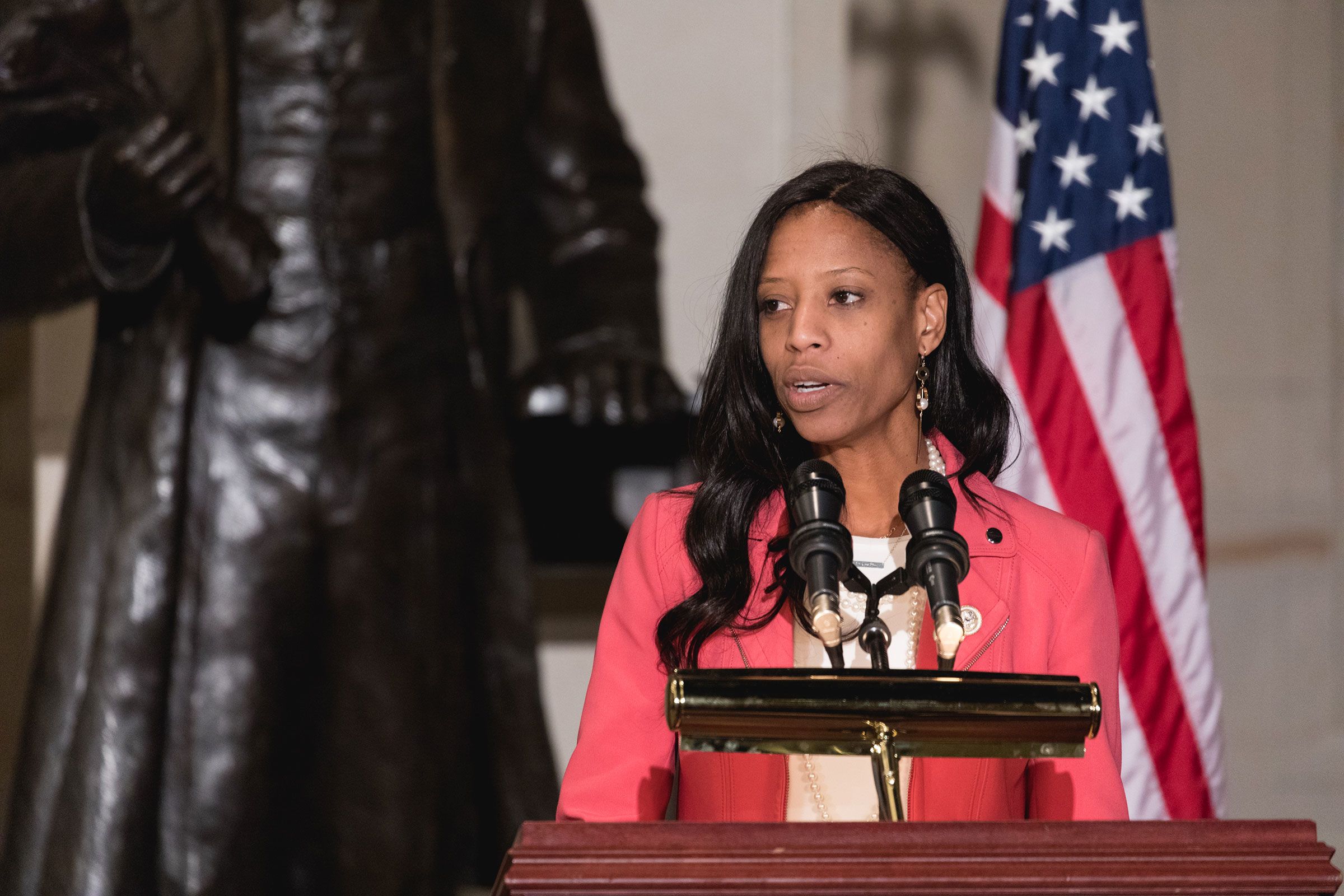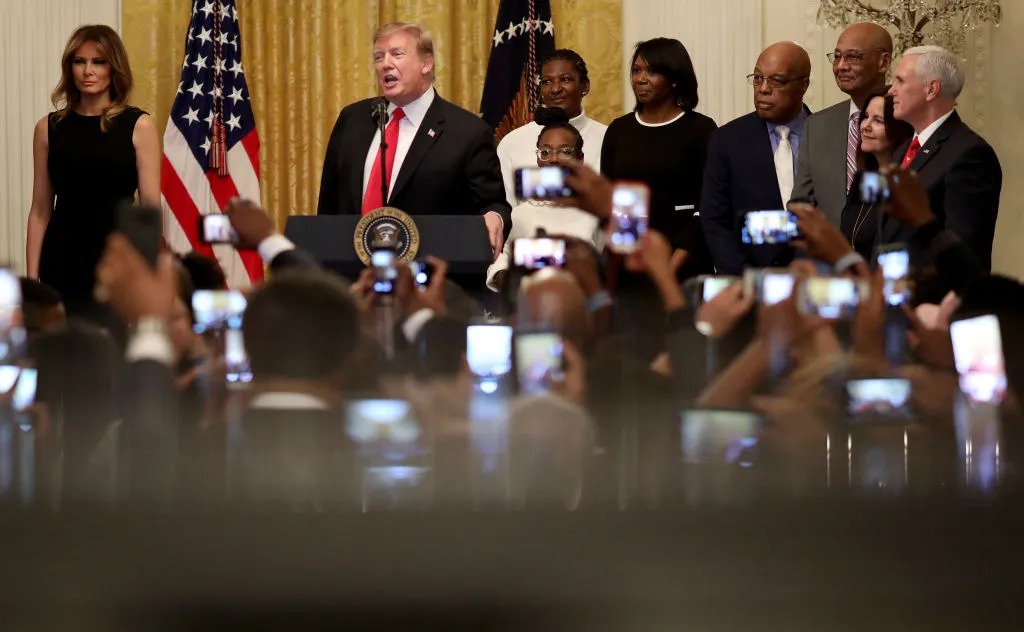- BlackVoter.Org
- Posts
- BlackVoter.Org
BlackVoter.Org


Mia Love, the first Black Republican woman elected to Congress, is facing a dire situation as her battle with glioblastoma, an aggressive form of brain cancer, intensifies. Her daughter, Abigale, shared the heartbreaking news that treatments are no longer effective, prompting the family to focus on comfort and quality time together.
Initially diagnosed in 2022, Mia had shown remarkable optimism throughout her ordeal, drawing strength from her faith and family. Despite the prognosis being daunting—typically just 10-15 months survival—Love previously maintained a hopeful outlook through her treatment efforts.
Her resilience has inspired many, capturing attention nationwide and drawing heartfelt messages from supporters, including Utah Governor Spencer Cox. As Mia Love continues to fight, her story resonates with those facing similar challenges, emphasizing the power of hope and family support in the face of adversity.

On March 7, 1965, Sheyann Webb-Christburg, just nine years old and dubbed the "Smallest Freedom Fighter," joined over 600 activists in Selma, Alabama, to confront the harsh realities of voter suppression during Bloody Sunday. As they approached the Edmund Pettus Bridge, police met them with violence, unleashing tear gas and attack dogs.
This brutal moment marked a pivotal change in the civil rights movement, capturing national attention and leading to the Voting Rights Act of 1965. Although often overlooked, Black women played a crucial role in organizing grassroots efforts that fueled this movement.
Figures like Dorothy Height of the National Council of Negro Women and Diane Nash were instrumental in mobilizing and supporting protests. Today, the legacy of these unsung heroes continues as organizations honor their contributions, ensuring that the fight for equality persists.
Webb-Christburg’s annual walk across the Edmund Pettus Bridge serves as a powerful reminder of their enduring impact and the ongoing struggle for justice.

In “The New Era of Religion and Politics,” Michael Wear explores the seismic shifts in the relationship between faith and politics in the U.S.
, particularly influenced by Donald Trump. While many Americans of faith still align with the Republican Party, the traditional framework of assessing politicians' “friendliness” to religion is becoming obsolete.
Trump has disrupted this paradigm, redefining the political landscape by placing his interests above shared values, positioning religious voters as his political territory rather than as partners. Wear argues that a new approach is needed—one that emphasizes service over status, urging politicians to view Christians not as mere constituents but as vital contributors to the common good.
As America navigates this transformed dynamic, the challenge lies not just with politicians but involves Christians themselves, who must advocate for their beliefs in the public sphere and shape a more inclusive and service-oriented vision of faith in politics.

In a striking reflection on the current political landscape, the article argues that many Trump supporters are feeling buyer's remorse after unknowingly voting against their own best interests. The author highlights the stark political polarization in the U.
S., where individuals are increasingly living and voting based on party lines, often ignoring facts that contradict their beliefs.
As Trump's policies begin to impact them negatively—such as healthcare cuts and rising living costs—they're realizing the implications of their choices. Yet, even amid this discontent, support for Trump remains surprisingly resilient among his base.
The piece stresses the need for a collective shift toward empathy and critical thinking, urging voters to recognize that the pain of “the other” ultimately affects everyone. It concludes with a poignant reminder: in unity, there is strength; when one suffers, we all bear the burden.

Behind the Gates: Discovering Prince George's County's Elite Black Community
Nestled in Prince George's County, Maryland, the Country Club at Woodmore showcases one of America’s wealthiest African-American communities, where luxury and legacy intertwine. Once a plantation site, this area now radiates "black excellence," with homes resembling castles and a median household income surpassing $214,000.
The community is the inspiration for Beyond the Gates, a groundbreaking soap opera featuring a primarily Black cast—an unprecedented move in daytime television. As the first show to center on a Black family from its inception since Generations, it highlights rich narratives often sidelined in media.
Local residents celebrate the excitement surrounding the series, viewing it as a long-overdue representation of their lives and successes. With a backdrop of historical shifts and triumphs, Woodmore stands as a testament to resilience and community pride, inviting viewers to see the luxurious realities beyond the gates.

Philadelphia recently hosted a powerful gathering at Germantown's Center in the Park, where nearly 300 attendees convened to develop a new "Black agenda" to combat surging racial inequities. This meeting, a continuation of over two centuries of Black-led protests in the city, showcased a rich history of activism dating back to 1817 when the first mass protest by African Americans took place at Mother Bethel AME Church.
Attendees voiced their outrage over contemporary policies threatening their rights, echoing past struggles against discrimination and injustice. While the journey has seen both triumphs, like the desegregation of public transport, and failures, such as ongoing police brutality, the resolve to effect change remains strong.
The organizers emphasized the importance of collective action moving forward, promising to unveil strategies including economic boycotts aimed at strengthening Philadelphia’s Black community. This enduring legacy of protest showcases Philadelphia as a beacon of resilience and activism against racial prejudice.

Former President Donald Trump has garnered a surprising approval rating of over 20% among Black voters, a slight increase from 16% in 2024. While these numbers may seem promising for Trump, especially against the backdrop of his controversial policies—including cuts to funding for Historically Black Colleges and Universities (HBCUs) and attacks on Diversity, Equity, and Inclusion (DEI) initiatives—the support remains modest and far from universal acceptance.
His slight gains are evident in battleground states like Georgia and North Carolina, but skepticism looms large; many in the Black community remain critical of his administration's impact on education and immigration. Polls vary widely, with some suggesting approval rates as high as 29%, but deeper sentiments reveal a community still wary of Trump's historical rhetoric and policies.
Despite these modest inroads, Trump's presidency continues to polarize many Black voters, echoing the challenges he faces in broadening his appeal.